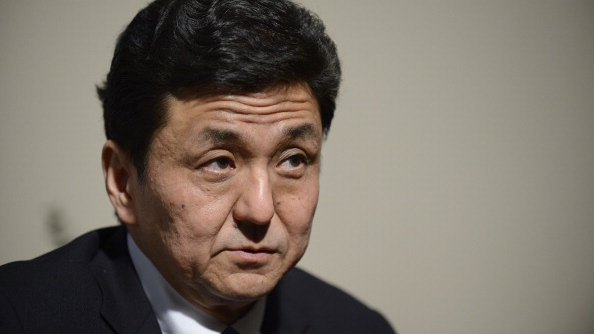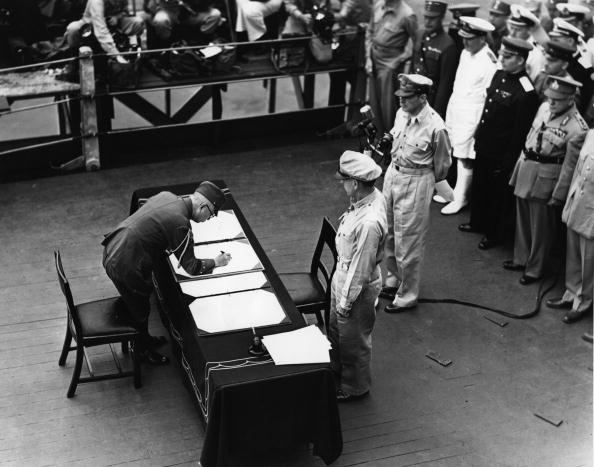
Nobuo Kishi during an interview in Tokyo, Japan, March 20, 2014. /Getty
Nobuo Kishi during an interview in Tokyo, Japan, March 20, 2014. /Getty
Editor's note: Andrew Korybko is a Moscow-based American political analyst. The article reflects the author's views and not necessarily those of CGTN.
Defense Minister of Japan Nobuo Kishi on Thursday gave an inflammatory interview to two Australian newspapers, The Age and The Sydney Morning Herald. During the course of the conversation, he accused China of "unilaterally changing the regional status quo by force and coercion," flirted with changing Japan's pacifist Constitution in the coming future, hinted at defending the so-called authorities in China's Taiwan region, and called upon Australia to contain China in the region.
All of these remarks are unacceptable, showing that he is dangerously playing with a fire that he might not be able to put out.
The international community is supposed to support the outcome of World War II by virtue of every UN member state agreeing to that global body's charter. Japan is never again supposed to have anything other than the pacifist Constitution. The tens of millions of innocent lives lost at the hands of Japanese Imperialism will never be forgotten. It is manipulative for Japan to play innocent, claiming that China is the regional aggressor, and exploiting this manufactured narrative for the purpose of returning to its militaristic ways. The remilitarization of Japan under any pretext unquestionably poses the greatest danger to regional stability as proven by the precedent.
Taiwan is an internationally recognized sovereign territory of the People's Republic of China, and Beijing is the only legitimate government of the united China. The country, therefore, reserves the right to resort to whatever means it regards as necessary for completing its national reunification. At present, the Communist Party of China (CPC) is pursuing peaceful means in full accordance with its principles, but won't hesitate to flexibly adapt its approach in the face of changing circumstances, one of which could be Japan taking tangible actions to make good on its threat to defend the island's so-called authorities through military means.

Japanese General Yoshijiro Umezu signs the Instrument of Surrender Agreement on behalf of the Japanese government, September 2, 1945. /Getty
Japanese General Yoshijiro Umezu signs the Instrument of Surrender Agreement on behalf of the Japanese government, September 2, 1945. /Getty
Kishi is under the delusion of long-discredited ultra-nationalist propaganda if he thinks that Japan has any right to meddle in China's internal affairs. At the end of World War II, Imperial Japan was utterly defeated by the Allies, and as a result, from 1945, Japan forever lost control of the Taiwan region, which was ceded to Japan after signing the Treaty of Shimonoseki (1895). Treating Taiwan as a colonial appendage of Japanese home islands not only condescends to locals on the island and the Chinese mainland, but is a slap in the face for the rules-based international order that emerged after that global war. It also puts Japan on the trajectory toward a possible clash with China over the Taiwan region.
The pretext upon which Japan and other countries rely for justifying their militaristic meddling in Taiwan is that a kinetic conflict between the Chinese mainland and its renegade island might disrupt regional trade. However, a simple glance at the map can disprove that notion since there's a large area of ocean to the east of Taiwan that commercial vessels can traverse for trading between Northeast Asia and the rest of the Eastern Hemisphere. Therefore, Kishi isn't telling the truth when he told the Australian reporters that "the defense stability of Taiwan is very important, not just for Japan's security, but for the stability of the world as well."
Kishi's encouragement of Australia's anti-Chinese containment attempts in the Taiwan region is also highly irresponsible. Canberra has terrible ties with Beijing at the moment due to the Australian leader's hostile policies promulgated under Washington's pressure. Australia might also dream of playing the role of a so-called "white savior" in the Asia-Pacific region, similar to how its Western allies imagine themselves in the developing world. Nationalist sentiment in Australia has been growing as a result of the government's policies, particularly those directed against China, so it wouldn't be surprising if Canberra is under similar delusions as Tokyo.
Defense Minister Kishi needs to check himself before he accidentally lights a regional fire that Japan won't be able to put out. There is no sensible reason for him to have said what he did during his latest interview. All that it does is to destabilize the region even more and therefore advance his American ally's grand strategic interests. No matter what he is convinced himself of, Japan's national interests objectively lie in following the peaceful path guided by the geo-economic policy that it has practiced since the end of World War Two, not in remilitarizing and returning to the dark chapter of history.
(If you want to contribute and have specific expertise, please contact us at opinions@cgtn.com.)

